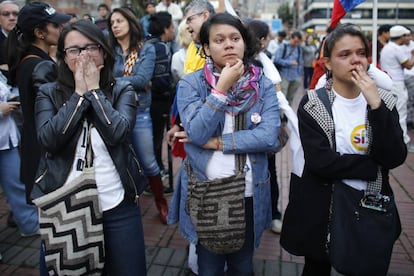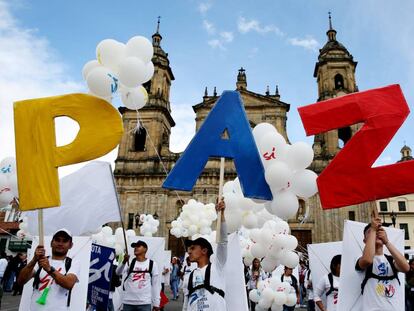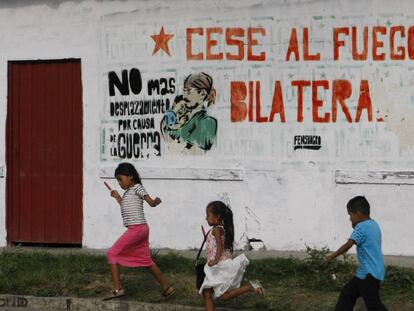Shock as voters in Colombia reject FARC peace deal
Deep distrust of the guerrilla group and a high abstention rate were key in the surprise result


Colombia stunned observers around the world on Sunday when voters narrowly rejected a hard-fought peace deal between the government and the Revolutionary Armed Forces of Colombia (FARC).
In a result that few had predicted, 50.2% of voters snubbed the deal which aimed to end a 52-year civil war in the country ¨C a conflict which has left at least 220,000 people dead, with another 45,000 missing and up to five million others displaced.
Polls had predicted solid backing for the ¡®yes¡¯ camp in a country exhausted by decades of war, but an abstention rate of more than 60% in the plebiscite made a mockery of those predictions. Massive levels of distrust in the guerrilla group also played a major factor in the outcome.
A last-minute move by the FARC to destroy 600 kilograms of explosives was seen as opportunistic
While President Juan Manuel Santos was quick to assure voters that a ceasefire remains in place, the surprise result leaves the country in limbo and without a roadmap. It also highlights the enormous polarization of Colombian society and marks a huge victory for former president ?lvaro Uribe, the chief proponent of the ¡®no¡¯ vote.
¡°Peace is exciting, but the text of the Havana deal is disappointing,¡± said Uribe of the deal brokered by President Santos in the Cuban capital.
In the lead-up to the election, the former leader had pushed the idea that the peace deal could be renegotiated if the ¡®no¡¯ camp prevailed on Sunday despite the current administration and FARC firmly rejecting that possibility. During the campaign, Uribe stressed what he and many Colombians saw as a major flaw in the peace accord ¨C the fact that it would allow members of the guerrilla group to enter mainstream politics and that FARC members would not be imprisoned if they recognized they had committed crimes.

The leftist rebels have attempted to modernize their image in the last 12 months but the result of Sunday¡¯s vote shows Colombians are hugely reluctant to trust the guerrillas after 52 years of war. Even FARC leader Rodrigo Londo?o¡¯s recent decision to apologize to all the group¡¯s victims failed to sufficiently change attitudes. And a last-minute announcement by FARC that it would bow to pressure to provide an inventory of all of its assets did little to sway opinion, while the destruction of 600 kilograms the day before the vote in a move verified by the United Nations was seen by many as mere opportunism.
The results of Sunday¡¯s ballot have also brought to the fore the lack of solidarity across Colombia. In the areas most heavily affected by the civil war ¨C mostly on the coast ¨C the ¡®yes¡¯ vote predominated. But in those urban areas and larger rural towns which have enjoyed relative peace for some time, support for the peace accord was far lower. Meanwhile, people in the country¡¯s interior rejected the deal.
The failure of the ¡®yes¡¯ camp to carry the day also shines a light on the lack of leadership in the Colombian political landscape where there is a desperate need to tackle chronic cronyism. Uribe¡¯s Democratic Center was the big winner of Sunday while President Santos was the big loser after calling a plebiscite that he never needed to hold.
Colombia now faces huge uncertainty. Despite the flaws of the peace deal ¨C flaws recognized even by President Santos ¨C it offered the promise of an end to the country¡¯s civil war. The country has chosen instead to take a leap into the great unknown.
English version by George Mills.
Tu suscripci¨®n se est¨¢ usando en otro dispositivo
?Quieres a?adir otro usuario a tu suscripci¨®n?
Si contin¨²as leyendo en este dispositivo, no se podr¨¢ leer en el otro.
FlechaTu suscripci¨®n se est¨¢ usando en otro dispositivo y solo puedes acceder a EL PA?S desde un dispositivo a la vez.
Si quieres compartir tu cuenta, cambia tu suscripci¨®n a la modalidad Premium, as¨ª podr¨¢s a?adir otro usuario. Cada uno acceder¨¢ con su propia cuenta de email, lo que os permitir¨¢ personalizar vuestra experiencia en EL PA?S.
?Tienes una suscripci¨®n de empresa? Accede aqu¨ª para contratar m¨¢s cuentas.
En el caso de no saber qui¨¦n est¨¢ usando tu cuenta, te recomendamos cambiar tu contrase?a aqu¨ª.
Si decides continuar compartiendo tu cuenta, este mensaje se mostrar¨¢ en tu dispositivo y en el de la otra persona que est¨¢ usando tu cuenta de forma indefinida, afectando a tu experiencia de lectura. Puedes consultar aqu¨ª los t¨¦rminos y condiciones de la suscripci¨®n digital.










































